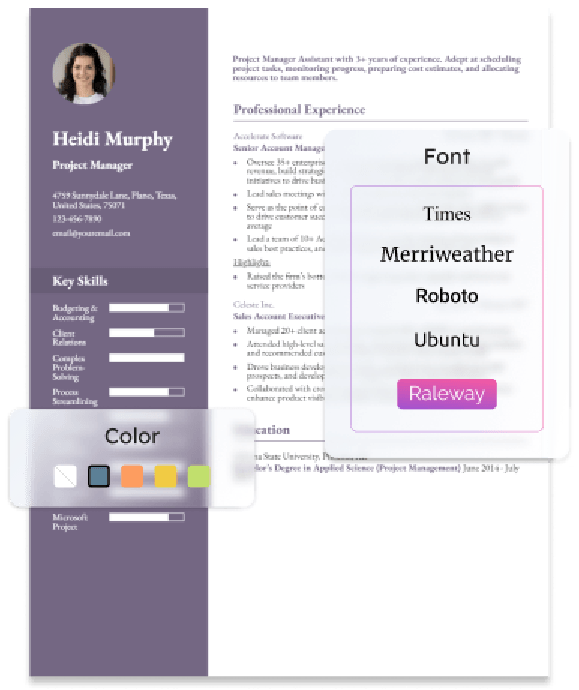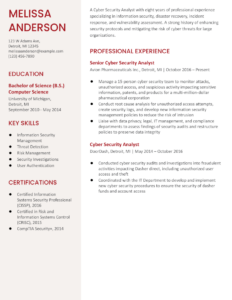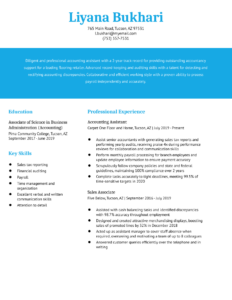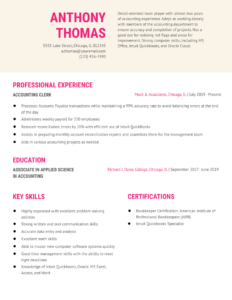How To Write an Engineering Resume
To write a good resume for engineering jobs, you’ll need to show you can design complex systems based on deep technical knowledge. If you want to improve your engineering resume, the tips and examples below can be helpful. They provide guidance on what information to include in each section of your resume.
- Entry-level
- Mid-career
- Senior-level
1. Craft an outstanding profile with a summary of your engineering qualifications
A strong Profile section will catch the hiring manager’s interest by giving the top reasons you excel as an engineer. What is your approach to the process of technical design? How has that helped you create sophisticated machines or structures in your engineering discipline?
Consider how you apply math or science principles to find real-world solutions. For instance, maybe you’ve built a reputation for working with cities on more eco-friendly infrastructure. Or perhaps you’re focused on developing robotics to help manufacturers raise efficiency. Whatever your key strengths as an engineer, feature them in your Profile section, and you can persuade the recipient of your resume to read it more closely.
Mechanical Engineering Profile Example:
Mechanical Engineer focused on finding robotics solutions to environmental and human problems. Demonstrated success collaborating with diverse teams to complete projects ahead of tight deadlines. Naturally curious and committed to gaining and applying new expertise. Master of Science in Mechanical Engineering.
Environmental Engineering Profile Example:
Licensed Environmental Engineer with nine years of experience designing processes for public health, recycling, waste disposal, and pollution control. Build strong relationships with city planners, waste technicians, business directors, and environmental scientists. Skilled at gathering, analyzing, and summarizing site data into detailed and accurate field reports. Bilingual: Fluent in English and Spanish. Master of Environmental Engineering.
2. Showcase your engineering experience
The Experience section is where you can convince hiring managers you’re qualified by giving detailed examples of your success in engineering. For each relevant job in your work history, brainstorm the specific products, equipment, or processes you developed. How did these projects mark an innovation or technical advancement? What was their outcome, and how did they help solve practical challenges for your company or customers? By answering these questions, you can give hiring managers a sense of the impact you’d have as an engineer at their organization.
Experience Example:
Environmental Engineer, Urban Environmental Consulting, Charlotte, NC | May 2018 to Present
[Award-winning consulting firm with 40+ employees]
- Conduct field assessments based on project specifications
- Manage engineering team and contractors for projects investigating air, soil, and water quality
- Analyze data and develop environmental reports for clients and local and federal agencies
Highlight:
- Designed innovative recycling program that reduced solid and hazardous waste disposal by 75%
3. Outline your education and engineering-related certifications
With the Education and Certifications sections, you can assure hiring managers that your technical design work has a strong knowledge base. Give basic details on your college degree(s), along with any courses, dissertations, or academic projects relevant to your target engineering role. You’ll also want to show your expertise by specifying whether you’re an Engineer in Training (EIT) or Professional Engineer (PE).
The following are templates and examples to help you format your education and certification details on your resume. Note that optional template areas appear in [brackets].
Education
Template
- Degree Name — [Major], School Name, City, ST | [Year]
- [Thesis or Dissertation]
Example
- Bachelor of Engineering, Massachusetts Institute of Technology (MIT), Cambridge, MA | 2012
Certification
Template
- Certification Name or Title, [Awarding Organization] | [Year]
Example
- Licensed Professional Engineer — Environmental Engineering, State of North Carolina | 2021
4. List engineering-related skills and proficiencies
Include a “Key Skills” (or “Areas of Expertise”) section on your resume to show the various engineering tools and methods you use. With this section, you can also emphasize your branch of engineering and the general math or science concepts behind it. Below are some common terms to consider for your engineering skills section:
| Key Skills and Proficiencies | |
|---|---|
| 3D Modeling | Civil Engineering |
| Complex Problem-Solving | Computer-Aided Design (CAD) |
| Cross-Functional Coordination | Data Gathering & Analysis |
| Design Calculations | Design Development |
| Engineering Product Data Management (EPDM) Software | Environmental Engineering |
| Environmental Science | Infrastructure Development |
| Mathematics | Mechanical Engineering |
| Mechatronics Design | New System Development |
| Physics | Process Streamlining |
| Product Improvement & Maintenance | Production Validation |
| Project & Program Management | Public Speaking & Presentations |
| Regulatory Compliance | Task Prioritization |
| Team Collaboration | Technical Writing & Reporting |
| Time Management | |
5. Keep your job descriptions jargon-free
One of the most common mistakes on engineer resumes is jargon, or using long technical words when a short one would do. A classic example: People use the words “utilize” or “utilization” when they should use “use.”
Jargon is tempting for engineers because the field is complex and technical. Whatever your branch of engineering, it probably has plenty of specialized terms with no simpler option (e.g., “mechatronics”). These terms are acceptable for your resume if they speak to your goals. The problem is when you trade out short, simple words for terms or phrases that are long and clunky – by doing this, you just make it harder for the hiring manager to read or understand your resume. Here are six more common examples of jargon:
change –> adjustment, modification
goal –> objective
launch –> establishment, implementation
law –> regulation
skill –> capability
task, duty –> responsibility
Don’t worry about jargon when you first draft each job description but keep it in mind later when you’re reviewing and editing what you’ve written. For any long word you’ve used, pause and ask: Is there a shorter synonym? This habit will help you make your resume a clear, concise record of what you offer employers.
Example:
Bad
- Utilized advanced project coordination capabilities to establish viable objectives and schedules
Good
- Used strong project management skills to set viable goals and schedules
How To Pick the Best Engineering Resume Template
As with most vocations, engineers should use a resume template that’s simple and straightforward. Opt for a visual template that lets the hiring manager quickly review your best career details. Select a clear resume font, and avoid any template with an overly colorful or elaborate design.
Engineering Text-Only Resume Templates and Examples
- Mechanical Engineering
- Environmental Engineering
- Civil Engineering
Oliver Green, PE
(989) 876-5454 | [email protected] | Charlotte, NC 93402 | www.linkedin.com/example
Profile
Licensed Environmental Engineer with nine years of experience designing processes for public health, recycling, waste disposal, and pollution control. Build strong relationships with city planners, waste technicians, business directors, and environmental scientists. Skilled at gathering, analyzing, and summarizing site data into detailed and accurate field reports. Bilingual: Fluent in English and Spanish. Master of Environmental Engineering.
Key Skills
- Cross-Functional Coordination
- Environmental Investigation
- Environmental Policy
- Project Review & Management
- Regulatory Compliance
- Team Collaboration
Professional Experience
Environmental Engineer, Urban Environmental Consulting, Charlotte, NC | May 2018 to Present
[Award-winning consulting firm with 40+ employees]
- Conduct field assessments based on project specifications
- Manage engineering team and contractors for projects investigating air, soil, and water quality
- Analyze data and develop environmental reports for clients and local and federal agencies
Highlight:
- Designed innovative recycling program that reduced solid and hazardous waste disposal by 75%
Environmental Engineer, City of Springfield, Springfield, NC | September 2014 to April 2018
- Monitored and controlled wastewater and waste air per environmental laws
- Inspected facilities, evaluated data, and prepared environmental reports for executives and the public
Highlight:
- Collaborated with geologists on a waste management program that reduced waste by 45%
Education
Master of Environmental Engineering, University of Maryland, College Park, MD | 2014
Bachelor of Engineering, Massachusetts Institute of Technology (MIT), Cambridge, MA | 2012
Certification
Licensed Professional Engineer — Environmental Engineering, State of North Carolina | 2021
Language
Fluency in Spanish
Frequently Asked Questions: Engineering Resume Examples and Advice
What are common action verbs for engineering resumes?+
For engineers, the best resume verbs will have to do with designing complex devices or systems – for example, “configured,” “innovated,” or “invented.” But there are various others you might use to describe your duties and contributions in this field. The following list can help you find the right mix of action verbs for your resume:
| Action Verbs | |
|---|---|
| Analyzed | Built |
| Calculated | Collaborated |
| Communicated | Configured |
| Constructed | Created |
| Designed | Developed |
| Devised | Diagnosed |
| Enhanced | Established |
| Executed | Explored |
| Generated | Implemented |
| Improved | Innovated |
| Introduced | Invented |
| Launched | Managed |
| Organized | Planned |
| Presented | Produced |
| Reported | Resolved |
| Solved | Streamlined |
| Strengthened | Structured |
| Supervised | Tested |
How do you align your resume with a job posting?+
The Bureau of Labor Statistics forecasts that jobs in architecture and engineering will increase by about four percent between 2021 and 2031. This growth rate is roughly the same as the average for all US jobs.
You can get more engineering job interviews if you tailor your resume for each application. One great way to do this is by adding brief descriptions of your past employers in brackets next to or below the employer’s name.
Employer descriptions let you show any similarities between your past organizations and the one that posted the job. For example, maybe you’ve worked at organizations of a similar size or in the same industry or sector. Or perhaps you’ve worked for organizations with a similar mission or leadership philosophy. By working these details into your descriptions, you can make your resume more relevant to the job opening.
What is the best engineering resume format?+
In nearly all cases you should use a Combination (or Hybrid) resume, because it’s easiest for hiring managers to learn about your pertinent skills and experience. It’s also easiest for you to modify based on your job goals.
With the Combination format, you highlight your most relevant skills and experience in your Experience or Work History section and an intro section. (This combination of work history and intro content is where the format gets its name.) Your resume intro should include a Profile summary and Key Skills section, but you may also include an Awards or Career Highlights section.

To increase your chances of an interview for engineering jobs, write and submit a strong cover letter. The key to an effective letter is customizing it based on each job opening. Read our engineering cover letter guide to learn how. For other related examples, see our civil engineering and mechanical engineering cover letter guides.
Craft your perfect resume in minutes
Get 2x more interviews with Resume Builder. Access Pro Plan features for a limited time!







